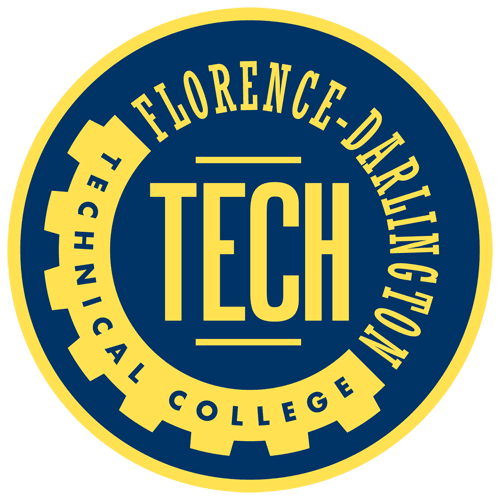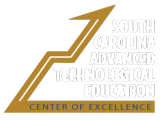Apprenticeships
Florence-Darlington Technical College Information on Apprenticeships
Interested companies in Apprenticeships and/or Customized Apprenticeship Training in the Florence-Darlington Technical College (FDTC) service area should contact Florence-Darlington Technical College's (FDTC) Continuing Education office at (843-413-2739) or by emailing Lauren Holland, Associate Vice President of Corporate and Workforce Development (This email address is being protected from spambots. You need JavaScript enabled to view it.). For more information on the SC Apprenticeship Initiative Grant (SCAI) grant opportunity, contact Becky Godbey, SCAI Grant Coordinator at (803-240-0349) or (This email address is being protected from spambots. You need JavaScript enabled to view it.). You may also learn more information about the Apprenticeship Carolina program and/or SCAI grant opportunity by scrolling down the page or by downloading the flyers (How to get Started), (SCAI Overview), (FDTC's Role), and (FDTC's Customized Training Resources for Employers)..
Mission
How it Works
The only requirements pertaining to apprentices entering a registered apprenticeship program are that they must be at least 16 years of age. Registered apprentices must be selected without regard to gender, race, age, sexual orientation or religious affiliation—just like any other employee.
Any other selection criteria is determined by the employer or group of employers sponsoring the program based upon the specific requirements of their industry.
Typically, registered apprentices will need to demonstrate that they have an aptitude and ability for the given occupation, that they meet any minimum educational requirements for a given program, and that they fulfill any health and safety requirements for an occupation.
Some employers choose to integrate the use of assessment tools such as WorkKeys into their selection process. Qualification criteria must be objective.
The tax credit is intended to offset the direct and indirect costs of establishing the registered apprenticeship program. Costs may include course design and development, instructional costs, training material and supplies, maintaining records and administering the program.
Apprenticeship Standards and Training Schedules
These documents are the “formation” documents for the registered apprenticeship program. They contain the parameters of the program and ensure that all legal requirements are met. They also lay out the program entry requirements, the wage progression, and the training curriculum that will be followed.
These documents are compiled and filed with the USDOL before enrolling apprentices in your program. While they may be revised and updated should your training needs change, these are filed once and are not an ongoing administrative issue. Your Apprenticeship Consultant will help you with the development of these documents.
Apprenticeship Agreements
As you accept apprentices into your program, they will need to enter into an Apprenticeship Agreement to show that they understand and accept the training arrangements of the program. You will need to file this paperwork and keep a copy for your records; however, it is possible to do this electronically through the South Carolina State Director’s Office of the USDOL. This should minimize the administrative impact on any given employer.
Monthly Progress Reports
It will be important for your registered apprentices to demonstrate successful completion of their training requirements so that you are sure they are progressing toward full skill level. It is also important to be able to identify skill sets where the registered apprentice is having difficulty.
A monthly progress report—maintained by the registered apprentice, but verified by the employer—allows for this feedback to occur. An employer can build worker accountability by having a registered apprentice maintain these records; however, an employer must provide a mechanism for verifying that the information is accurate and that adequate progress is being made. These should be maintained in a registered apprentice’s personnel file so that a transcript of the training completion is documented.
You can contact an Apprenticeship Consultant through Apprenticeship Carolina or you can contact the South Carolina Office of the US Department of Labor’s Office of Apprenticeship.
Your Consultant will provide you with guidance throughout the process of setting up your registered apprenticeship program; however, it may be helpful for you to begin thinking about some key issues to ensure that the program is customized to best meet your training needs.
Your Consultant will ask you to provide input with the following steps of the start-up process:
- Identify an occupation for which you have a training need. Your Consultant will be able to tell you if the occupation is already recognized as eligible for registered apprenticeships or if you can pursue a new career program.
- Determine all of the knowledge and skills needed for the occupation or occupations in the program. Your Consultant will be able to tell you if there are existing models that might assist with this process. If you are interested in more than one occupation, you will need to develop the outlines for each career path.
- Determine what qualifications applicants will need to enter your program.
- Identify those who will provide supervision and direction to registered apprentices on the job.
- Identify a provider for the related technical instruction component of your program for each occupation. This instruction is often provided by a technical college.
- Identify an individual that will maintain the standards of training as identified. This can include confirming length of training, handling the selection procedure, administration of any tests of competencies, for example.
- Draw up the Apprenticeship Standards and Work Processes based upon the above information. Your Apprenticeship Consultant will assist you with this process and the remaining steps for registration with the USDOL Office of Apprenticeship.
Tax Credits
SC Apprenticeship Initiative Grant (SCAI)
Available for: Manufacturing, information technology and professional services companies with registered apprenticeship programs in South Carolina.
Grant will be used to fund Apprenticeship scholarships for training conducted by the technical colleges as well as a Return on Investment (ROI) Study through the University of South Carolina, Moore School of Business.
Learn More






